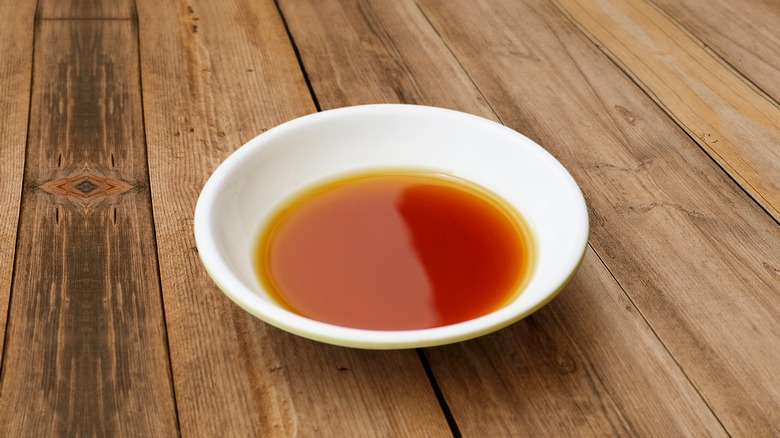Give Mac And Cheese A Major Flavor Boost With One Fishy Addition
Despite being an iconic comfort food, mac and cheese can sometimes fade into the background or be relegated to a lazy midweek meal. But why should that be the case? Mac and cheese is one of humanity's greatest achievements — it should be the star of the show! Fortunately, there are a multitude of ways to make creative mac and cheese, and one particularly effective yet unexpected method is adding fish sauce.
This fishy condiment is a bit of a dark horse when it comes to upgrading flavor in just about anything. Contrary to what you might think, it won't make your food taste fishy. Instead, it'll pack your dish with umami, intensifying the flavors while adding a dark, aromatic kick. Simply stir a dash (or two) into your sauce once it comes together, and you'll have a mac that's funkier, cheesier, and tangier than before.
How much fish sauce you add really depends on your personal preference — some people find the smell quite pungent, though the taste is not overpowering, imparting a subtle sweetness that works great in dishes like Thai-style chicken and green mango salad. Anywhere from a few drops to a couple of tablespoons will give you varying degrees of that unique, deeply complex flavor.
So what is fish sauce, anyway?
Fish sauce is made by extracting the liquid released during the fermentation of small fish, usually anchovies. A little sugar is added to round out the flavor, and that's pretty much it. The process is fairly standardized across most fish sauces, so choosing one isn't a particularly difficult task. Just try to make sure that the ingredient list includes only anchovies, water, salt, and sugar. Anything else suggests there isn't much real fish flavor in the sauce. Once you've got it, an open bottle can last for two years or longer, making it a worthwhile investment.
So, how does this ingredient upgrade your mac and cheese? It's all about science. Fish sauce is high in a substance called glutamate, a naturally occurring amino acid that our taste buds happen to love. In fact, fish sauce has one of the highest glutamate contents of any food, right up there with hard cheeses like parmesan. If the word glutamate sounds familiar, it's probably because it's a major component of MSG — which, by the way, isn't bad for you; that's a myth rooted in racism.
When it comes to mac and cheese, the glutamate in fish sauce enriches the sauce's natural flavors, making it nuttier, saltier, and giving it more body. It also brings a bit of natural sweetness, which complements the creaminess of the sauce and enhances the dish as a whole.


